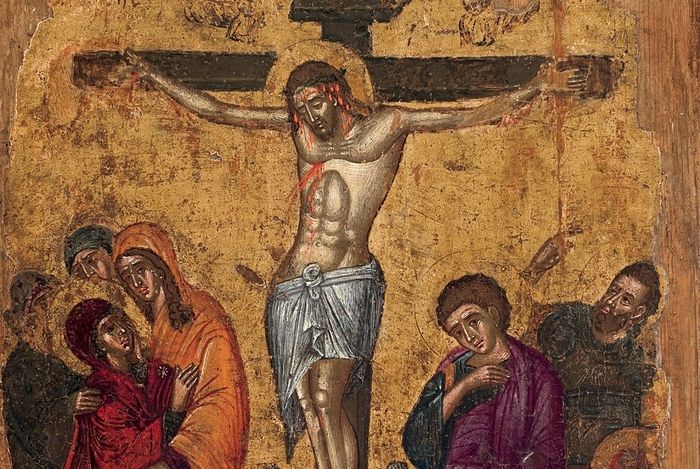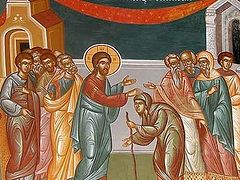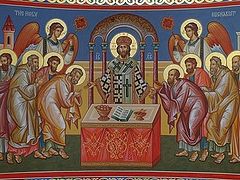Therefore is the Kingdom of Heaven likened unto a certain king, which would take account of his servants. And when he had begun to reckon, one was brought unto him, which owed him ten thousand talents. But forasmuch as he had not to pay, his lord commanded him to be sold, and his wife, and children, and all that he had, and payment to be made. The servant therefore fell down, and worshipped him, saying, Lord, have patience with me, and I will pay thee all. Then the lord of that servant was moved with compassion, and loosed him, and forgave him the debt. But the same servant went out, and found one of his fellowservants, which owed him an hundred pence: and he laid hands on him, and took him by the throat, saying, Pay me that thou owest. And his fellowservant fell down at his feet, and besought him, saying, Have patience with me, and I will pay thee all. And he would not: but went and cast him into prison, till he should pay the debt. So when his fellowservants saw what was done, they were very sorry, and came and told unto their lord all that was done. Then his lord, after that he had called him, said unto him, O thou wicked servant, I forgave thee all that debt, because thou desiredst me: Shouldest not thou also have had compassion on thy fellowservant, even as I had pity on thee? And his lord was wroth, and delivered him to the tormentors, till he should pay all that was due unto him. So likewise shall My Heavenly Father do also unto you, if ye from your hearts forgive not every one his brother their trespasses (Mt. 18:23-35).
The parable of the unmercirfu servant begins with the words, Therefore is the Kingdom of Heaven likened unto a certain king, and that means that the mystery of forgiveness is hidden in Divine grace, in the mystery of the Kingdom of Heaven. The king, demanding an account from his servants, finds among them one who owed him 10,000 talents. This sum is so enormous that it’s not clear how he could have paid it off. It’s like someone coming to you today and saying you must immediately pay $10,000,000, although 10,000 talents is even more. Christ wants to show that our debt to God absolutely exceeds our ability to pay. The king decided to take what the servant could give and ordered to sell this man and his family into slavery, into work, until he paid in full.
But this man fell on his face, begging him to have patience with him, to leave him free, promising to pay for everything. Seeing that he wanted to do the impossible, the king took pity upon him and forgave him his debt. Forgiveness was given because of his attitude towards the debt, because of his recognition of the justice of this debt, because of his resolve to fulfill everything fairly—not because of his ability to pay the debt. And we see that the guilty man was released, and the innocent man, the king, paid the debt, for he expunged 10,000 talents from what belonged to him. This example reveals to us the mystery of Christ’s forgiveness. Forgiveness means the innocent suffering for the guilty.
But according to his present nature, man is more inclined to lock someone up in debtor’s stocks than to release him—to demand what is his rather than to forgive, and thus the Lord continues on past the beginning of the parable.
The forgiven man, rejoicing in his freedom, went out to meet another man who owed him a comparatively small sum—100 denarii. Someone once calculated that it’s 500 times smaller than the debt that was forgiven him. Nevertheless, he demanded payment. He grabbed him by the throat and began to strangle him so he would immediately pay off his debt. The poor debtor fell at his feet, begging him to have patience, as he himself had begged not long before, promising to pay everything, with the same words that the one who received forgiveness had spoken in his despair. But he did not want to endure and threw the man into prison until he could pay off his debt. It was so scandalous that the poor man’s friends, stunned by the injustice, reported everything to the king. Measuring his judgment with the same measure that this man gave his debtor, the king handed over to torture in prison until he paid his entire debt. And we hear, So likewise shall My Heavenly Father do also unto you, if ye from your hearts forgive not every one his brother their trespasses.
We will try to understand the mystery of forgiveness from this parable. There is justice in the world. The king demands an account for our debts. But his justice is above justice, and therefore the debtor receives forgiveness. When this forgiven man, having learned nothing—not having understood that there is justice only when it is above justice—demands that which justly belongs to him, he commits a blatant injustice. And then the king reminds him that there is justice in the world. In that the world strives to carry out justice without God, without the higher justice, there is so much injustice and cruelty in the world, and everyone throws each other into prison.
“Prison” in Biblical language means hell. Among this hell of sin and non-forgiveness in which we live, we must take care to reject that which we irrationally often call legalism—that is, that which ordinary justice stands for, and strive at the same time for that which is above justice. False forgiveness is not forgiveness. We should be just, so as not to confuse utopia and prophecy, so that our striving for the higher, final good would be distinguished from the reality of today’s evil, reaching its final threshold; so the apocalypse and Final Judgment would not become a cruel caricature of human life, where history is predetermined to have a happy ending, where everyone is forgiven everything, without any human involvement.
Forgiveness is not a bag of money we joyfully run off with because our debts were forgiven. I want to exist in a completely human way, to be a man—one who distinguishes good from evil, who sees evil in the world and hates it, because forgiveness is the highest opposition to evil—not reconciliation with evil. It is only in giving no place to the devil that I can draw near to God. How can I forgive and take upon myself the consequences of the sin of another if I am fatally inflicted with my own sin? How can I pay for another when I myself am poor and in debt all around? Where am I to get a heart that can forgive (that is, that sincerely loves, attaining to the highest good)? God so appreciates forgiveness that not only does He Himself forgive, but obliges everyone to forgive, and inasmuch as He knows that we are unable to give Him anything, He takes upon Himself everything that happens to us and compensates for our lack of forgiveness by His forgiveness, and it gives it to us. If we do not accept this gift, we do not accept not only our neighbors, but also God, and there will be no forgiveness for us.
And here, in the parable, lies a mystery that is decisive perhaps for the fate of every man and the whole of mankind. The forgiveness that we receive from God reveals to us the cost of sin. No one can fully understand how forgiveness surpassing all justice is given if he does not see the Son of God Who became man. Forgiveness is given at a high cost—the Blood of Christ. This is not so much about the wisdom, but the foolishness of the Cross. Through forgiveness, the deepest knowledge of sin comes to us—and repentance, opening the Kingdom of Heaven, and compassion for every man wounded by sin.
Blessed is he whose transgression is forgiven, whose sin is covered. Blessed is the man unto whom the Lord imputeth not iniquity (Ps. 31:1–2). Our joy in this gift of grace does not give us the right to withhold it just for ourselves. Knowing the cost of our forgiveness, does it really not preserve us from impudence towards those whom we must forgive?
Among this hell of Earth, we are not angels, but weak people. We wrestle with sin, but we have many sins and grievances, and, if we don’t forgive one another, evil remains and accumulates in the world, and enters into the Church, which therefore ceases to be Christ’s. The Christian people are not a people of power—they are a people that believes in Jesus Christ, Who came to seek out and save the perishing. They are a forgiven people, who, because they are forgiven, are called to bear the Gospel of God’s forgiveness to all people. We must speak with authority and bear witness to it before all people.
There is justice in the world, without which there cannot be that which is above justice. However, the ultimate injustice is in rejecting what is above justice. In the last turn of history, we will fulfill our destiny to the measure that we are faithful to this mystery. It is only in resisting the injustice of every sin that reigns in the world that we can truly pray together with Christ for those who crucify us, Father forgive them, for they know not what they do!





